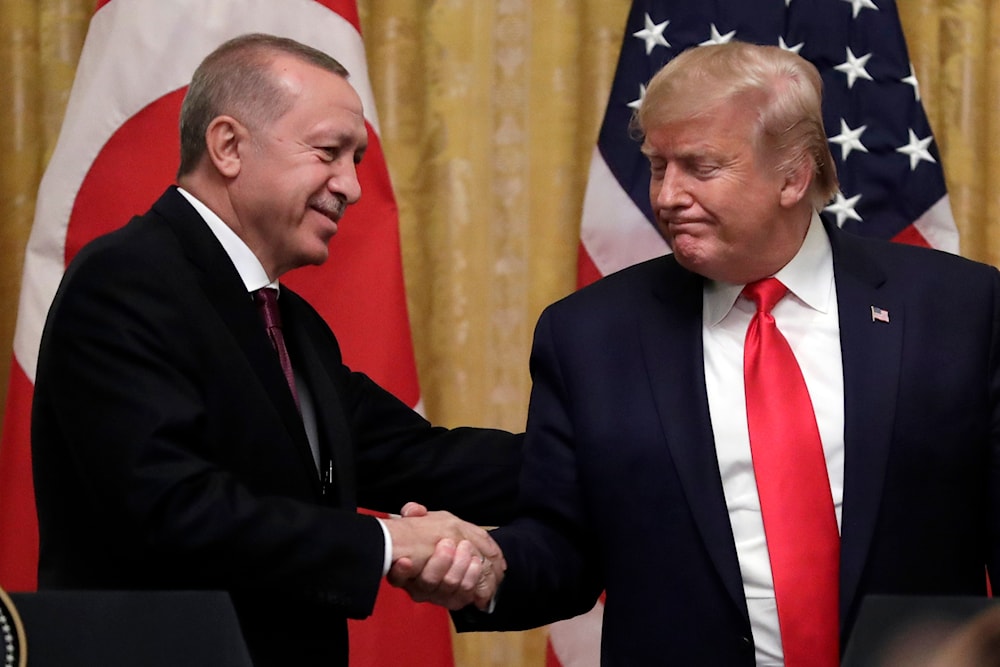Trump eyes lifting sanctions, selling fighter jets to Turkey
Reports of Trump's consideration closely follow a phone call between him and Turkish President Recep Tayyip Erdogan in which they discussed several regional and international matters.
-

President Donald Trump shakes hands with Turkish President Recep Tayyip Erdogan after a news conference in the East Room of the White House, in Washington, Nov. 13, 2019 (AP)
United States President Donald Trump is reportedly considering lifting sanctions on Turkey that prevented the sale of one of the most sought-after warplanes to Ankara, following a conversation with Turkish President Recep Tayyip Erdogan.
Trump's legal team sought a legal and technical analysis to avoid finding Turkey in violation of the Countering America's Adversaries Through Sanctions Act (CAATSA) sanctions, Fox News Digital stated, citing a source familiar with the request.
Turkish President Erdogan emphasized that "it is necessary to end CAATSA sanctions, finalize the F-16 procurement process and finalize Türkiye's re-participation in the F-35 program," in order to bolster the defense cooperation between Ankara and Washington, during a phone call between the two presidents on Sunday.
Previously, Congress approved the $23 billion sale of 40 F-16s along with modernization kits for 79 jets in Turkey’s current fleet last year, while ongoing negotiations continue between Turkey's Defense Ministry and Lockheed Martin, the manufacturer of the jet.
Trump expressed an intent to assist in finalizing the sale of F-16 fighter jets to Turkiye while remaining open to the possibility of selling the country its ultimate objective, F-35 jets, if both sides can reach an agreement that ensures Turkey's Russian S-400 system becomes inoperable, as confirmed by two sources to Fox News Digital.
The dismantling of the Russian air defense system could include partially disassembling components of the machinery or moving them to a US-controlled base in Turkey.
"The F-35 cannot coexist with a Russian intelligence collection platform that will be used to learn about its advanced capabilities," the White House stated in 2019, emphasizing that Turkey's purchase would have "detrimental impacts" on its participation in NATO.
Erdogan, Trump discuss Ukraine, Syria, defense ties
Turkish President Recep Tayyip Erdogan and former US President Donald Trump had a phone conversation last Sunday, during which they discussed diplomatic efforts to resolve the war in Ukraine, stabilize Syria, and strengthen defense cooperation, according to a statement from Erdogan's office.
During their conversation, Erdogan expressed Turkey's support for Trump's decisive approach to addressing the Russia-Ukraine conflict, emphasizing his commitment to pursuing "a just and lasting peace." However, Turkey's stance remains complex, as it balances economic and defense ties with Moscow while simultaneously supplying military aid to Ukraine.
As the two presidents discussed the situation in Syria, the Turkish president called for the removal of sanctions on Damascus to help the news Syrian administration function properly and facilitate the return of Syrian refugees to their country.
In the context of Syria, Erdogan once again denounced US support for Kurdish militias in Syria, which Turkey regards as an offshoot of the Kurdish Workers' Party (PKK), a group it classifies as a terrorist organization. Ankara has repeatedly criticized Washington's alliance with the Syrian Democratic Forces (SDF), arguing that it threatens Turkey's national security.
Fragile partnership with unresolved tensions
While the Erdogan-Trump conversation signals ongoing efforts to strengthen US-Turkey ties, contradictions in the latter's policies remain evident.
Ankara's simultaneous criticism of "Israel" while continuing indirect trade, its dual relationship with Russia and Ukraine, and its controversial backing of Syria's new government all complicate its diplomatic standing.
The strengthening of US-Turkey relations has also raised concerns in "Israel", which views Ankara's increasing role in Syria as a potential threat. Israeli officials have lobbied the US to maintain Russian influence in Syria to counterbalance Turkish expansion and have expressed concerns over Erdogan's alleged support for Hamas.
Turkey's regional ambitions also pose a challenge to "Israel's" strategic dominance, particularly if Ankara continues expanding its influence in Syria with Washington's backing.

 4 Min Read
4 Min Read








